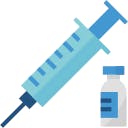Use of Remdesivir in COVID-19
Author: Dr. Guneet J Mann, MD
With the COIVD-19 Pandemic at 3.8 million cases, as of May 06, 2020 and the numbers still adding, the race is on to find a treatment for SARS-CoV-2. A number of drugs are in the race and many vaccines are in the pipeline. So far, no gold standard of treatment has been found. Remdesivir is one of the drugs that has been viewed as a potential treatment for COVID-19.
Remdesivir is an investigational broad-spectrum antiviral drug. It is a prodrug and is intracellularly metabolized to an analogue of adenosine triphosphate. This metabolization can occur in several human cell lines . An in vitro study has demonstrated that nucleoside triphosphate works as an incorporation competitor with adenosine triphosphate, confuses the viral RNA-dependent RNA polymerase (RdRp), acts as a delayed RNA chain terminator against Ebola virus, evades proofreading by viral exoribonuclease, and causes a decrease in viral RNA production. It has been developed by Gilead Sciences Inc.
Remdesivir has activity against members of several virus families, including filoviruses (e.g., Ebola) and coronaviruses (e.g., SARS-CoV and Middle East respiratory syndrome coronavirus [MERS-CoV]) and has shown prophylactic and therapeutic efficacy in nonclinical models of these coronaviruses. In vitro testing has shown that Remdesivir has activity against SARS-CoV-2. It has also shown promise in animal models for treating SARS-CoV-2 infection. Remdesivir appears to have a favorable clinical safety profile, as reported on the basis of experience in approximately 500 persons, including healthy volunteers and patients treated for acute Ebola virus infection.

The drug must be administered intravenously and the optimal dosing and duration for COVID-19 are not yet known. Gilead Sciences Inc. cautions that infusion-related reactions and liver transaminase elevations have been seen in patients treated with the drug. Recommendations from the company are, that if signs and symptoms of a clinically significant infusion reaction occur, the administration of Remdesivir should be stopped immediately and appropriate treatment should be initiated. Patients should have appropriate clinical and laboratory monitoring to aid in early detection of any potential adverse events. Renal and hepatic functions have to be tested prior to initiating daily therapy with Remdesivir; additionally serum chemistries and hematology need to be monitored daily during therapy.
The US Food and Drug Administration (FDA) issued an emergency use authorization (EUA) for Remdesivir for the treatment of suspected or laboratory-confirmed COVID-19 in adults and children hospitalized with severe disease. (May 01, 2020). According to FDA, there are no adequate, approved, or available alternative treatments for COVID-19 and the known and potential benefits of using Remdesivir to treat SARS-CoV-2 currently outweigh the known and potential risks of this drug.
The emergency use authorization came just two days after the report of a National Institutes of Health (NIH)–sponsored clinical trial (April 29, 2020). It was a randomized, controlled trial involving 1063 patients, which began on February 21 and closed to new enrollments on April 19, 2020. The trial is known as the Adaptive COVID-19 Treatment Trial, or ACTT, sponsored by the National Institute of Allergy and Infectious Diseases (NIAID), part of the National Institutes of Health, and is the first clinical trial launched in the United States to evaluate an experimental treatment for COVID-19.
According to a preliminary data analysis, Remdesivir was better than placebo as far as the primary endpoint, time to recovery, is concerned. This metric is often used in influenza trials. Recovery in ACTT was defined as being well enough for discharge from the hospital or returning to normal activity level.
Preliminary results indicate that patients who received Remdesivir had a 31% faster time to recovery than those who received placebo (p<0.001). Specifically, the median time to recovery was 11 days for patients treated with Remdesivir compared with 15 days for those who received placebo. Results also suggested a survival benefit, with a mortality rate of 8.0% for the group receiving remdesivir versus 11.6% for the placebo group (p=0.059).
The first study site was the University of Nebraska Medical Center/Nebraska Medicine, in February 2020. A total of 68 sites ultimately joined the study—47 in the United States and 21 in countries in Europe and Asia.
Another study, regarding compassionate use of Remdesivir for Patients with Severe Covid-19, was published in New England Journal of Medicine (April 10, 2020). This study was supported by Gilead Sciences. The company began accepting requests from clinicians for compassionate use of Remdesivir on January 25, 2020. Approval of requests for use of Remdesivir was reserved for hospitalized patients who had SARS-CoV-2 infection confirmed by Reverse-Transcriptase–Polymerase-Chain-Reaction (RT-PCR) assay and either an oxygen saturation of 94% or less while the patient was breathing ambient air or a need for oxygen support. In addition, patients were required to have a creatinine clearance above 30 ml per minute and serum levels of alanine aminotransferase (ALT) and aspartate aminotransferase (AST) less than five times the upper limit of the normal range. The clinicians also had to agree not to use other investigational agents for Covid-19.The treatment consisted of a 10-day course of Remdesivir, with a loading dose of 200 mg intravenously on day 1 and 100 mg daily for the following 9 days.
Of the 61 patients who received at least one dose of remdesivir, data from 8 could not be analyzed (including 7 patients with no post-treatment data and 1 with a dosing error). Of the 53 patients whose data was analyzed, 22 were in the United States, 22 in Europe or Canada, and 9 in Japan. At baseline, 30 patients (57%) were receiving mechanical ventilation and 4 (8%) were receiving extracorporeal membrane oxygenation (ECMO). During a median follow-up of 18 days, 36 patients (68%) had an improvement in oxygen-support class, including 17 of 30 patients (57%) receiving mechanical ventilation who were extubated. A total of 25 patients (47%) were discharged, and 7 patients (13%) died; mortality was 18% (6 of 34) among patients receiving invasive ventilation and 5% (1 of 19) among those not receiving invasive ventilation.
The authors did not find any new safety concerns during short-term Remdesivir therapy in this compassionate-use cohort. Nonclinical toxicology studies have shown renal abnormalities, but no clear evidence of nephrotoxicity due to Remdesivir therapy was observed in this study. As reported in studies in healthy volunteers and patients infected with Ebola virus, mild-to-moderate elevations in ALT, AST, or both were observed in this cohort of patients too. However, considering the frequency of liver dysfunction encountered in patients with Covid-19, attribution of hepatotoxicity to either Remdesivir or the underlying disease is challenging. Nevertheless, the safety and side-effect profile of Remdesivir in patients with Covid-19 require proper assessment in placebo-controlled trials.
Ongoing Remdesivir Trials
| Sr. | Particulars | Sponsor | Participants | Likely Completion |
|---|---|---|---|---|
| 1 | A Phase 3 Randomized Study to Evaluate the Safety and Antiviral Activity of Remdesivir (GS-5734™) in Participants With Moderate COVID-19 Compared to Standard of Care Treatment | Gilead Sciences | 1600 & still recruiting | May 2020 |
| 2 | A Phase 3 Randomized Study to Evaluate the Safety and Antiviral Activity of Remdesivir (GS-5734™) in Participants With Severe COVID-19 | Gilead Sciences | 6000 & still recruiting | May 2020 |
| 3 | A Multicenter, Adaptive, Randomized Blinded Controlled Trial of the Safety and Efficacy of Investigational Therapeutics for the Treatment of COVID-19 in Hospitalized Adults | National Institute of Allergy and Infectious Diseases (NIAID). USA | 800 & still recruiting | April 1, 2023 |
| 4 | Multi-center, Adaptive, Randomized Trial of the Safety and Efficacy of Treatments of COVID-19 in Hospitalized Adult | Institut National de la Santé Et de la Recherché Médicale, France | 6000 & still recruiting | March 2023 |
| 5 | WHO Solidarity trial: an adaptive, randomized, open-label, multi-center clinical trial of the safety and efficacy of remdesivir and three other investigational treatments in hospitalized adults diagnosed with COVID-19 | WHO Solidarity Trail |
References:
- de Wit E, Feldmann F, Cronin J, et al. Prophylactic and therapeutic remdesivir (GS-5734) treatment in the rhesus macaque model of MERS-CoV infection. Proc Natl Acad Sci U S A 2020;117:6771-6776.
- Sheahan TP, Sims AC, Graham RL, et al. Broad-spectrum antiviral GS-5734 inhibits both epidemic and zoonotic coronaviruses. Sci Transl Med 2017;9(396):eaal3653-eaal3653.
- Sheahan TP, Sims AC, Leist SR, et al. Comparative therapeutic efficacy of remdesivir and combination lopinavir, ritonavir, and interferon beta against MERS-CoV. Nat Commun 2020;11:222-222.
- Wang M, Cao R, Zhang L, et al. Remdesivir and chloroquine effectively inhibit the recently emerged novel coronavirus (2019-nCoV) in vitro. Cell Res 2020;30:269-271.
- Mulangu S, Dodd LE, Davey RT Jr, et al. A randomized, controlled trial of Ebola virus disease therapeutics. N Engl J Med 2019;381:2293-2303.
- European Medicines Agency. Summary on compassionate use: Remdesivir Gilead. April 3, 2020.
- Zhang C, Shi L, Wang FS. Liver injury in COVID-19: management and challenges. Lancet Gastroenterol Hepatol 2020 March 4 (Epub ahead of print)
- Warren T.K., Jordan R., Lo M.K., Ray A.S., Mackman R.L., Soloveva V. Therapeutic efficacy of the small molecule GS-5734 against Ebola virus in rhesus monkeys. Nature. 2016;531:381–385.
- Tchesnokov E.P., Feng J.Y., Porter D.P., Götte M. Mechanism of inhibition of Ebola virus RNA-dependent RNA polymerase by remdesivir. Viruses. 2019;11 pii: E326.
- Agostini M.L., Andres E., Sims A.C., Graham R.L., Sheahan T.P., Lu X. Coronavirus susceptibility to the antiviral remdesivir (GS-5734) is mediated by the viral polymerase and the proofreading exoribonuclease. mBio. 2018;9 pii: e00221-18.
- Jonathan Grin, Norio Ohmagari, Daniel Shin, George Diaz, Erika Asperges, Antonella Castagna, Torsten Feldt, Gary Green, Margaret L. Green, François-Xavier Lescure, Emanuele Nicastri, Rentaro Oda et al.Compassionate Use of Remdesivir for Patients with Severe Covid-19.April 10, 2020. DOI: 10.1056/NEJMoa2007016
Source:
Share this on Social media
HEALTH DISCLAIMER
This blog provides general information and discussions about health and related subjects. The information and other content provided in this blog, or in any linked materials, are not intended and should not be construed as medical advice, nor is the information a substitute for professional medical expertise or treatment.
The content is for information purpose only and is not a medical advice. Qualified doctors have gathered information from reputable sources; however Credence Medicure Corporation is not responsible for errors or omissions in reporting or explanations. No individual should use the information, resources and tools contained herein to self diagnose or self treat any medical condition.
If you or any other person has a medical concern, you should consult with your health care provider or seek other professional medical treatment. Never disregard professional medical advice or delay in seeking it because of something that have read on this blog or in any linked materials. If you think you may have a medical emergency, call your doctor or emergency services immediately.
The opinions and views expressed on this blog and website have no relation to those of any academic, hospital, health practice or other institution.
Credence Medicure Corporation gives no assurance or warranty regarding the accuracy, timeliness or applicability of the content.
comments powered by Disqus

